List of Adenanthos species
This is a list of Adenanthos species, subspecies and named hybrids. Taxa are listed in alphabetical order, and summary information is provided. For the most recent taxonomic arrangement, see Nelson's taxonomic arrangement of Adenanthos.
| Name | Description | Taxonomy | Distribution and habitat | Conservation status[1] | Image | |||||
|---|---|---|---|---|---|---|---|---|---|---|
| Habit[2] | Leaf type[3] | Flower colour | Published | Section | Range | Soil | Vegetation | |||
| A. acanthophyllus (Prickly Woollybush) |
Tall shrub, lignotuberous | Holly-like | Dark red to pale pink-red | A.S.George, 1974 | A. sect. Adenanthos | Shark Bay | Sand of marine origin | Scrub or heath | ||
| A. apiculatus | Prostrate subshrub, non-lignotuberous | Entire or lobed | Cream | R.Br., 1810 | A. sect. Adenanthos | Stirling Range to King George Sound and Bremer Bay | Lateritic soils, sand | Scrub or heath | ||
| A. argyreus (Little Woollybush) |
Small shrub, non-lignotuberous | Laciniate | Bright red-pink | Diels, 1905 | A. sect. Adenanthos | Lake King to Wyallkatchem to Southern Cross | Lateritic sand | Scrub or heath | ||
| A. barbiger (Hairy Glandflower) |
Small shrub, lignotuberous | Entire or lobed | Scarlet | Lindl., 1839 | A. sect. Eurylaema | Toodyay to Manjimup to Augusta | Lateritic gravel | Open forest | ||
| A. cacomorphus | Medium shrub, lignotuberous | Laciniate | Bright pink | E.C.Nelson, 1978 | A. sect. Adenanthos | Fitzgerald River | Lateritic sand | Scrub or heath | Priority 2 (WA) | |
| A. cuneatus (Coastal Jugflower) |
Medium shrub, occasionally a prostrate subshrub, lignotuberous | Laciniate | Crimson | Labill., 1805 | A. sect. Adenanthos | Walpole to Twilight Cove | Sand | Scrub or heath |  | |
| A. × cunninghamii (Albany Woollybush) |
Medium shrub, non-lignotuberous | Laciniate | Dull crimson | Meisn., 1845 | A. sect. Adenanthos | King George Sound | Sand of marine origin | Scrub or heath | Priority 4 (WA) | |
| A. cygnorum (Common Woollybush) |
Tall shrub or prostrate subshrub, non-lignotuberous | Laciniate | Light pink, cream, or green | Diels, 1905 | A. sect. Adenanthos | Kalbarra to Arthur River | Lateritic soils, sand | |||
| A. cygnorum subsp. chamaephyton | Prostrate subshrub, non-lignotuberous | Laciniate | Light pink, cream, or green | E.C.Nelson, 1978 | A. sect. Adenanthos | Mundaring and Chidlow | Lateritic gravel | Open forest | Priority 4 (WA) | |
| A. cygnorum subsp. cygnorum (Common Woollybush) |
Tall shrub, occasionally a tree, non-lignotuberous | Laciniate | Light pink, cream, or green | A. sect. Adenanthos | Kalbarra to Arthur River | Lateritic soils, sand | Open forest, scrub or heath | 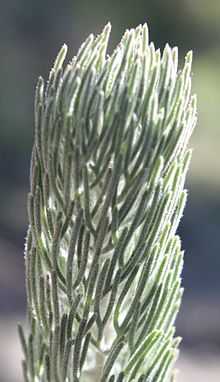 | ||
| A. detmoldii (Scott River Jugflower) |
Tall shrub, non-lignotuberous | Entire or lobed | Yellow and orange/brown | F.Muell., 1874 | A. sect. Eurylaema | Scott River to Whicher Range | Peat and waterlogged soils | Scrub or heath | Priority 4 (WA) | 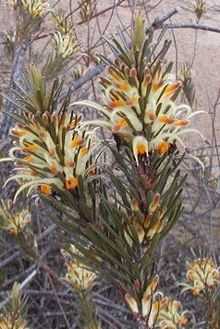 |
| A. dobagii (Fitzgerald Woollybush) |
Small shrub, non-lignotuberous | Laciniate | Cream or pale pink | E.C.Nelson, 1978 | A. sect. Adenanthos | Fitzgerald River | Skeletal soils | Scrub or heath | Endangered (EPBC Act)
Rare (WA) |
|
| A. dobsonii | Small shrub, lignotuberous | Entire or lobed | Red and/or cream | F.Muell., 1868 | A. sect. Adenanthos | Cape Arid to Israelite Bay | Sand | Scrub or heath | ||
| A. drummondii | Small shrub, lignotuberous[4] | Laciniate | Scarlet apex, yellow base | Meisn., 1845 | A. sect. Adenanthos | Bullsbrook to Wongan Hills to Three Springs | Lateritic soils | Scrub or heath | ||
| A. ellipticus (Oval-leaf Adenanthos) |
Medium shrub, non-lignotuberous | Entire or lobed | Orange-red and cream | A.S.George, 1974 | A. sect. Adenanthos | Mount Barren Ranges | Skeletal soils | Scrub or heath | Vulnerable (EPBC Act)
Rare (WA) |
|
| A. eyrei (Toolinna Adenanthos) |
Small shrub, non-lignotuberous | Laciniate | Dark crimson | E.C.Nelson, 1978 | A. sect. Adenanthos | Toolinna | Sand of marine origin | Scrub or heath | Endangered (EPBC Act)
Rare (WA) |
|
| A. filifolius | Medium shrub, non-lignotuberous | Laciniate | Cream and black | Benth., 1870 | A. sect. Adenanthos | Stirling Range to King George Sound and Bremer Bay | Skeletal soils | Scrub or heath | Priority 3 (WA) | |
| A. flavidiflorus | Small shrub, lignotuberous | Laciniate | Bright red-pink | F.Muell., 1859 | A. sect. Adenanthos | Bremer Bay to Hyden | Lateritic sand | Scrub or heath | ||
| A. forrestii | Medium shrub, lignotuberous | Laciniate | Pale red and cream, or cream | F.Muell., 1882 | A. sect. Adenanthos | Twilight Cove, Toolinna and Israelite Plain | Sand of marine origin | Scrub or heath | ||
| A. glabrescens | Small shrub, with or without lignotuber | Entire or lobed | Pink-scarlet and cream | E.C.Nelson, 1978 | A. sect. Adenanthos | Lake King to Fitzgerald River to Ravensthorpe | Skeletal soils and lateritic sand | Scrub or heath | ||
| A. glabrescens subsp. exasperatus | Small shrub, non-lignotuberous | Entire or lobed | Pink-scarlet and cream | E.C.Nelson, 1978 | A. sect. Adenanthos | Lake King to Halls Track | Skeletal soils | Scrub or heath | ||
| A. glabrescens subsp. glabrescens | Small shrub, lignotuberous | Entire or lobed | Pink-scarlet and cream | A. sect. Adenanthos | Fitzgerald River to Ravensthorpe | Lateritic sand | Scrub or heath | |||
| A. gracilipes | Small shrub, lignotuberous | Laciniate | Cream and red-pink | A.S.George, 1974 | A. sect. Adenanthos | Johnson Lakes and Frank Hann National Park | Lateritic sand | Scrub or heath | Priority 3 (WA) | |
| A. ileticos (Club-leaf Adenanthos) |
Medium shrub, lignotuberous | Laciniate | Pale pink-red | E.C.Nelson, 1978 | A. sect. Adenanthos | Esperance to Norseman | Lateritic sand | Open forest, woodland | Priority 4 (WA) | |
| A. labillardierei | Medium shrub, non-lignotuberous | Laciniate | Cream and claret | E.C.Nelson, 1978 | A. sect. Adenanthos | Barren Ranges | Skeletal soils | Scrub or heath | Priority 4 (WA) | |
| A. linearis | Small shrub, non-lignotuberous | Entire or lobed | Cream with pink apex | Meisn., 1856 | A. sect. Adenanthos | Stirling Range to King George Sound and Bremer Bay | Skeletal soils | Scrub or heath | Priority 2 (WA) | |
| A. macropodianus (Kangaroo Island Gland Flower) |
Medium shrub, non-lignotuberous | Laciniate | Red-pink | E.C.Nelson, 1978 | A. sect. Adenanthos | Kangaroo Island | Lateritic soils, sand | Open forest, scrub or heath | 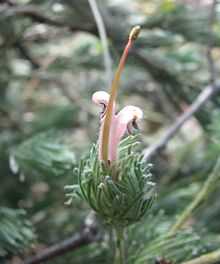 | |
| A. meisneri (Prostrate Woollybush) |
Medium shrub, lignotuberous | Laciniate | Red-purple or purple | Meisn., 1845 | A. sect. Adenanthos | Swan River to Point D'Entrecasteaux | Sand | Open forest, scrub or heath | 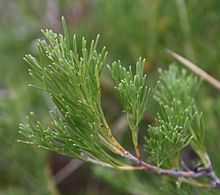 | |
| A. obovatus (Basket Flower) |
Small shrub, lignotuberous | Entire or lobed | Scarlet | Labill., 1805 | A. sect. Eurylaema | Gingin to Augusta to Green Range, also Narrogin | Skeletal soils, lateritic sand, peaty sand and waterlogged soils | Open forest, scrub or heath | 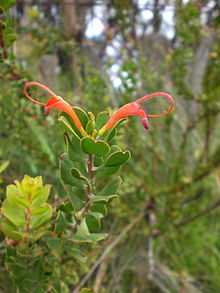 | |
| A. oreophilus (Woollybush) |
Medium shrub, non-lignotuberous | Laciniate | Scarlet | E.C.Nelson, 1978 | A. sect. Adenanthos | Fitzgerald River area | Lateritic gravel | Scrub or heath | ||
| A. × pamela | Medium shrub, lignotuberous | Entire or lobed | Orange or light red | E.C.Nelson, 1986 | A. sect. Eurylaema | Scott River | Priority 4 (WA) | |||
| A. pungens (Spiky Adenanthos) |
Medium shrub or prostrate subshrub, non-lignotuberous | Laciniate | Pale or dark pink | Meisn., 1845 | A. sect. Adenanthos | Tambellup and Hamella Hill | Skeletal soils and lateritic sand | Scrub or heath | ||
| A. pungens subsp. effusus (Sprawling Spiky Adenanthos) |
Prostrate subshrub, non-lignotuberous | Laciniate | Pale pink | E.C.Nelson, 1978 | A. sect. Adenanthos | Tambellup | Lateritic sand | Scrub or heath | Endangered (EPBC Act)
Rare (WA) |
|
| A. pungens subsp. pungens (Spiky Adenanthos) |
Medium shrub, non-lignotuberous | Laciniate | Dark pink | A. sect. Adenanthos | Hamella Hill | Skeletal soils | Scrub or heath | Vulnerable (EPBC Act)
Rare (WA) |
||
| A. sericeus (Coastal Woollybush) |
Tall shrub, occasionally a tree, non-lignotuberous | Laciniate | Scarlet | Labill., 1805 | A. sect. Adenanthos | King George Sound to Warriup, Cape Le Grand, Cape Arid | Skeletal soils, and sand of marine origin | Scrub or heath | ||
| A. sericeus subsp. sericeus (Coastal Woollybush) |
Tall shrub, non-lignotuberous | Laciniate | Scarlet | A. sect. Adenanthos | Cape Le Grand, Cape Arid | Skeletal soils | Scrub or heath | 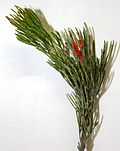 | ||
| A. sericeus subsp. sphalma | Tall shrub, occasionally a tree, non-lignotuberous | Laciniate | Scarlet | E.C.Nelson, 1978 | A. sect. Adenanthos | King George Sound to Warriup | Sand of marine origin | Scrub or heath | ||
| A. stictus | Tall shrub, non-lignotuberous | Laciniate | Crimson | A.S.George, 1974 | A. sect. Adenanthos | Watheroo to Coorow | Lateritic sand | Scrub or heath | ||
| A. terminalis (Yellow Gland Flower) |
Medium shrub, non-lignotuberous | Laciniate | Cream | R.Br., 1810 | A. sect. Adenanthos | Eyre Peninsula, Kangaroo Island, Adelaide to Little Desert | Lateritic soils, sand | Scrub or heath | ||
| A. velutinus (Velvet Woollybush) |
Tall shrub, non-lignotuberous[5] | Laciniate | Red-purple or purple | Meisn., 1856 | A. sect. Adenanthos | Cranbrook | Skeletal soils | Scrub or heath | Endangered (EPBC Act)
Rare (WA) |
|
| A. venosus | Medium shrub, lignotuberous | Entire or lobed | Dull crimson and cream | Meisn., 1856 | A. sect. Adenanthos | Fitzgerald River | Skeletal soils | Scrub or heath | ||
Footnotes
- ↑ Conservation status under the federal Environment Protection and Biodiversity Conservation Act 1999 (EPBC Act) is based on the Species Profile and Threats (SPRAT) Database published by the Australian Government Department of Sustainability, Environment, Water, Population and Communities.
In Western Australia, legislative protection is afforded only to plants gazetted as "Rare" or "Extinct" under the Wildlife Conservation Act 1950, but the Department of Environment and Conservation also define Priority 1, 2, 3 and 4 conservation classes; see Declared Rare and Priority Flora List for definitions. The Western Australian conservation classes given here are sourced from FloraBase, the online plant database of the West Australian Herbarium.
Species within a listed conservation status have not been assigned a class at federal or state level, and may be assumed to be relatively secure.
- ↑ Habit classes used here follow Nelson (1975): 99, Table 5:1 (Life-forms in Adenanthos), and this is the information source for all entries not otherwise cited. Five forms are recognised: trees, tall (over 2 m) shrubs, medium (1–2 m) shrubs, small (less than 1 m, but not prostrate) shrubs, and prostrate shrubs. Entries also indicate whether the species possesses a lignotuber. Those that do typically have many stems arising from the underground rootstock, resulting in a smaller stature and a mallee habit. Non-lignotuberous species have a single stem, and usually grow fairly erect.
- ↑ Three leaf types are recognised, following Nelson (1975): 92, 94:
- "Holly-type" leaves are flat, and divided into spiny lobes. This leaf type is very common in Proteaceae, but occurs in only one Adenanthos species
- "Entire of lobed" leaves are flat, with margins that are entire or lobed. These two cases are treated as a single type because it is common for species with lobed leaves to have entire leaves when young, or sporadically produce lobed leaves; and vice versa.
- "Laciniate" leaves are deeply divided into many long, thin laciniae. This leaf type is typical of the species known as woollybushes.
- ↑ Nelson (1978a): 332.
- ↑ Nelson (1978b).
References
- "FloraBase". West Australian Herbarium, Department of Environment and Conservation, Government of Western Australia. Retrieved 2011-01-16.
- Nelson, Ernest Charles (1975). Taxonomy and Ecology of Adenanthos in Southern Australia (PhD thesis). Australian National University.
- Nelson, Ernest Charles (1978a). "A taxonomic revision of the genus Adenanthos Proteaceae". Brunonia 1: 303–406. doi:10.1071/BRU9780303.
- Nelson, E. Charles (1978b). "Studies in Adenanthos Labill. (Proteaceae) II: The taxonomic status of A. velutina Meisn. reassessed". Glasra 2: 57–69.
- "Species Profile and Threats (SPRAT) Database". Department of Sustainability, Environment, Water, Population and Communities, Australian Government. Retrieved 2011-01-16.